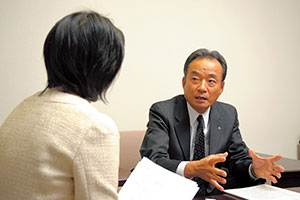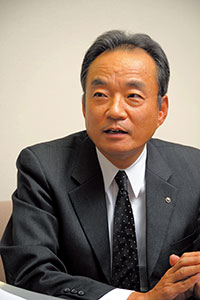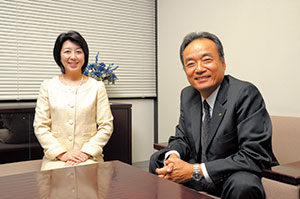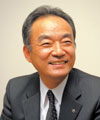Challenge for 2010: Becoming a service creation business group
—Mr. Katayama, it has been about two years since the launch of the Next Generation Network (NGN). As the director of the Technology Planning Department, could you brief us on what has been accomplished to date?
Well, thanks to everyone’s efforts, the NGN is progressing smoothly. The provision of NGN services began in 2008, and in September 2009, the number of NGN subscribers exceeded one million. Looking forward, the NGN will be available in all areas that have optical access by March 2011. At present, optical access is available to about 90% of the population throughout the country, which means that 90% of the Japanese population will be able to use the NGN in a year's time. It is therefore important that we now work on providing services that make the most of NGN features and give customers great pleasure.
—What kind of impact do you think NGN expansion will have?
With the aim of becoming a service creation business group, the NTT Group is working to expand the NGN and NGN-based services, solutions, and global business. We intend to use NGN technology to provide services that can help solve social problems related to the declining birthrate and aging society, the environment, care giving, medical treatment, and education. We would also like to apply it to the development of digital signage, cloud computing, and other fields and thus contribute to the creation of new markets and economic growth in general.
—In other words, application of information and communications technology (ICT) centered around the NGN can give birth to new practices and culture.
That’s right. For example, one key feature of the NGN is the high level of quality that it provides compared with previous networks. One service that makes good use of this is the IP (Internet protocol) retransmission of high-definition-quality digital terrestrial broadcasts. As you probably know, Japan is scheduled to terminate analog TV broadcasting in July 2011. To help customers handle this switchover to digital terrestrial broadcasts, efforts are being made to have them change to wired access (optical access) instead of simply replacing antennas.
Optical access will let them use not only digital-terrestrial IP retransmission services but also video-on-demand services. This will undoubtedly change the way that people think of TV—the ability to watch desired programs when you like means that TV is no longer just a passive activity. This trend is related to the creation of new content, the merging of communications and broadcasting, and the transformation of TV culture.
Another key feature of the NGN is security. The security measures it provides will prevent information leaks, spoofing, and other security-related problems, enabling customers to work safely and securely from home. This will lead to an expansion of teleworking and related services.
—The spread of teleworking should provide a working environment to people taking care of the sick, people watching over small children, and the elderly. At the same time though, isn’t there a risk of alienation from society with teleworking?
I can certainly understand the concern that teleworkers might come to feel alienated, but this problem is not something that can be solved by the NTT Group alone. For example, there are various ideas that should be able to improve the lives of teleworkers, such as forming societies for people engaged in teleworking or establishing sites where teleworkers living in the neighborhood can gather and work. The government is also providing support to teleworkers as a matter of policy with the aim of increasing the population of teleworkers. If society on the whole can recognize the value of teleworking, then individual attitudes should also change and the number of people who understand the need for teleworking should increase.
2010 is the year in which the NGN rollout period will expand to the entire country. This includes the construction of a fixed and mobile broadband network. The birth of new businesses can be expected as various fields in industry merge, such as communications & broadcasting and finance & distribution. In a quickly changing social environment, I would like to take an active stance in finding out what services our customers really need and in trying out new things to give birth to those services.
Until recently, we tended to think that “If we build a good network, customers will use it.” From here on, however, we must consider new ways of getting our customers to use the network. To this end, I believe that for the provision of new services, it is essential that we pursue alliances with content companies, idea companies, and other companies with value to offer instead of trying to do everything ourselves within NTT.

—I see. It’s easy to understand this approach to social problem solving. But what are your thoughts on the cost management of providing such services?
As stated in our Medium-term Management Strategy, the NTT Group will endeavor to reduce costs in both network construction and network operation & maintenance and to make work more efficient so as to improve productivity in facility operations. The emphasis here is on achieving cost reductions through technology development. Without the cost reduction efforts we have achieved, optical services would never have achieved the coverage they have today. Of course, we will not rest on our laurels here. We expect more technology developments to help make operations even more efficient and reduce costs even further. We are working to reduce procurement costs by unifying the specifications for goods and items used by the various companies in the NTT Group.
In addition, the introduction of bendable optical fiber that is easier to use is making installation and construction work more efficient. In terms of operation and maintenance, it is important that we make the network resistant to failure and easy to repair. The work of network construction and operation is performed not just by the NTT Group alone but by various entities in cooperation. In the past, we worked to improve efficiency by in-house means, but from here on, we must reassess our overall work process, which involves other companies whose work is related to ours. With that said, I would like to construct a supply chain to help us reduce costs even more.
Japan as an issue-facing developed country— the basis for change
—NTT Group’s stance toward such problems looks promising. But as concern grows for the environment and the development of a low-carbon society, how would you like to see the NTT Group respond?
That’s a good question. To begin with, I feel that we ourselves must change. The NTT Group is currently involved in a movement called Total Power Revolution (TPR) to reduce the amount of energy that we use, and as part of this movement we are formulating energy-saving measures. Specifically, we are working to reduce the energy usage of each and every piece of equipment. In particular, we are focusing on air conditioning systems, which use a lot of energy. In this respect, we are designing air conditioning systems to be more efficient by deploying energy-efficient equipment and we are upgrading existing equipment. Each group company is exercising its know-how to come up with ways of saving energy, and those companies with good approaches are sharing them with other group companies so that the entire group can work together to save energy.
Another way in which NTT is responding to environmental issues is by promoting the use of ICT to reduce the total amount of CO2 emitted by society. For example, teleworking and videoconferencing can reduce CO2 emissions caused by the transportation of people from one point to another. Last year, many companies cut back on business trips because of concern over Swine Flu, and videoconferencing was used as a means of preventing a pandemic. In effect, this gave people more opportunities to try out videoconferencing, and many people have said that they now understand its usefulness as a result of their experiences.

—I see that ICT can even be used to resist the spread of flu, and from a broad perspective, to help preserve the environment. Since environmental problems affect the entire world, the level of ICT throughout the world should be raised. Are there any specific efforts to expand NTT’s and Japan’s ICT expertise globally?
Yes, there are, but there are several aspects to these efforts. First, in terms of business, NTT is expanding its telecommunications business and systems integration business overseas. Second, Japan’s and NTT’s technologies themselves are expanding overseas. Overseas expansion of technologies like fiber to the home (FTTH) and the NGN, which Japan and NTT led the world in developing, will help the NTT Group and also the Japanese manufacturing industry to set up overseas operations. It will also help improve Japan’s overall international competitiveness. These efforts include international standardization activities, visits by NTT engineers to overseas communications operators to introduce NTT technology, and invitations for individuals to visit Japan for events such as the NTT Tsukuba Forum. Since those to whom we introduce technology include communications operators, I think it is meaningful that NTT engineers introduce our experiences to them and talk about the ways in which the NTT network is actually being used. I also believe that ICT can be used to reduce costs and solve environmental problems as well as to improve the international competitiveness of Japanese industry itself.
Some people say that Japan is an issue-facing developed country. The issues that we face here in Japan, such as the declining birthrate and aging society and the environment, seem to have begun here before developing elsewhere in the world. If these problems can be solved by ICT, then I feel that being an issue-facing developed country could become a source of strength. To this end, I would like to work with various partners to develop not just individual technologies but also ICT systems to solve these problems and then expand these technologies and systems overseas.
—So a problem can be a source of strength. But ICT for solving such problems has already penetrated our daily lives to the extent that we now take it for granted. Nowadays, service interruptions can even make customers feel betrayed. No doubt, unpublicized efforts are being made to ensure the stable provision of ICT services.
Society is becoming increasingly reliant on ICT, and the importance of safety and security in the communications infrastructure is increasing. Making use of its experiences in dealing with past disasters and accidents, the NTT Group is working to improve reliability in facilities, technologies, and operations to ensure that services are not interrupted. To make facilities more reliable, we are establishing multiple transmission routes and distributing vital communication centers, and to make technologies more reliable, we are introducing hitless protection switching techniques. Furthermore, as the NTT Group network is also connected to the infrastructures of various other companies, we are actively participating in coordination activities between infrastructure operators. These activities are becoming increasingly important in order to maintain customer convenience by ensuring that even if a disaster or accident should occur, there will never be an avalanche of service disruptions.
In terms of security measures, we are providing authentication functions in the NGN to verify the telephone number and IP address allocated to each circuit to prevent unauthorized access as in spoofing, in which someone makes use of another customer’s telephone number. This is an era of online shopping and banking for customers, but in the last few years we have seen an increase in spoofing, unauthorized access, and other cyber crimes. We are working to solve these problems so that our customers can use NGN services without worry.
Working to achieve safe and secure network operations in this way makes people aware of the fact that we are operating a network, but safety and security is really achieved, I believe, when customers can use services in a stress-free manner without having to think about the existence of the network itself. We will continue to exert ourselves to that end.
—Mr. Katayama, could you leave us with a message for all the engineers who work in network support?
Certainly. First of all, I would like to point out that technology becomes a service once it is used. I would ask our engineers to approach their daily work thinking how technology might be used and enjoyed by our customers and how it might make a social contribution. Secondly, I would also like to point out the importance of communication. Work is not something that can be completed on one’s own. Communicating with various people can help an engineer realize and overcome his or her barriers and make true progress. We are now entering an era of coordination and collaboration. We will need to communicate with people both inside and outside the company and build up relationships in which both parties can grow.

↑ TOP

